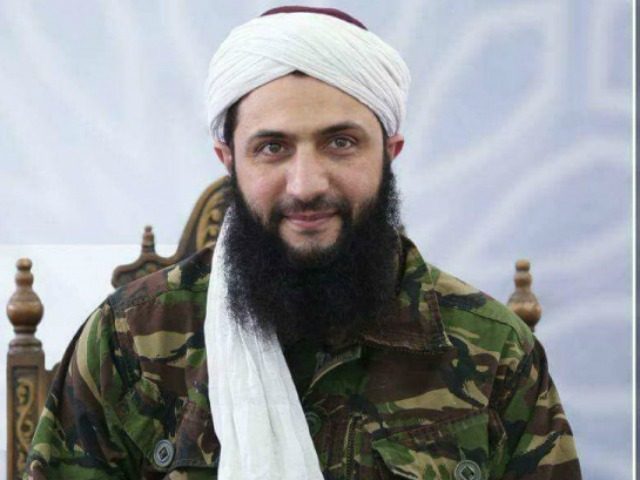The Nusra Front, formally known as Jabhat al-Nusra, has been al-Qaeda’s franchise in Syria since late 2011. The Syrian group’s leader has announced it will now cut its ties with al-Qaeda and become independent, with al-Qaeda’s blessing.
The announcement came from Nusra Front leader Abu Mohammed al-Julani in his first video statement. As the BBC reports, Julani announced that his group would be renamed Jabhat Fateh al-Sham, which translates to “Front for the Conquest of Syria/the Levant,” and will have “no affiliation to any external entity.”
The reason for the split, and the reason al-Qaeda endorsed it, was to “remove the pretext used by powers, including the U.S. and Russia, to bomb Syrians.” In other words, Julani thinks his group has been unfairly targeted because it was linked to al-Qaeda, and now that it has been formally rebranded as an independent entity, foreign powers will no longer have an excuse to bomb them.
Al-Qaeda second-in-command Ahmed Hassan Abu al-Khayr said Nusra’s leadership had been instructed to “go ahead with what protects the interests of Islam and Muslims and what protects jihad.”
“The brotherhood of Islam is stronger than any organisational links that change and go away,” declared al-Qaeda’s number one, Ayman al-Zawahiri.
The Russians do not need much of a pretext to bomb enemies of the Assad regime, and the U.S. clearly is not buying this “rebranding” strategy.
White House spokesman Josh Earnest, not even troubling himself to use the Nusra Front’s new name, said:
The United States continues to assess that Nusra Front leaders maintain the intent to conduct eventual attacks in and against the West and there continues to be increasing concern about Nusra Front’s growing capacity for external operations that could threaten both the United States and Europe.
In fact, a report earlier this year from the Institute for the Study of War, and American Enterprise Institute, portrayed the Nusra Front as “much more dangerous to the U.S. than the ISIS model in the long run.”
“We judge any organization, including this one, much more by its actions, its ideology, its goals,” added State Department spokesman John Kirby. “Thus far, there’s no change to our views about this particular group. We certainly see no reasons to believe that their actions or their objectives are any different. And they are still considered a foreign terrorist organization.”
Perhaps it would have been more crafty for the al-Qaeda bosses to avoid admitting they ordered the “breakaway” as a propaganda ploy to “protect jihad.” Also, they are making the charade much less convincing by actively seeking closer ties with other Islamist groups in Syria.
CNN notes that just two weeks ago, the United States announced closer cooperation with Russia against the Nusra Front to “restore the cessation of hostilities, significantly reduce the violence and help create the space for a genuine and credible political transition” in Syria. Nusra is one of the groups excluded from the cessation of hostilities agreement, along with ISIS.
Of course, it is unlikely that anyone in the Nusra Front or al-Qaeda expected the Western world to accept this “rebranding” effort and let them go on their merry way. The goal is to create propaganda opportunities with other Islamist groups, who can be nudged into the al-Qaeda umbrella by Nusra leaders who are supposedly no longer al-Qaeda operatives, but share their “core ideology.” There will be much caterwauling about how the Americans and Russians are still unfairly bombing “Jabhat Fateh al-Sham.”
CNN quoted analysts who also made an interesting case that the Nusra “rebranding” and the involvement of al-Qaeda second-in-command Masri are an indication Masri – supposedly “under arrest” in Iran, with the details rather murky, until recently – is actually in Syria, and may be preparing to take charge of al-Qaeda from Zawahiri.
This would enable Masri to continue Zawahiri’s strategy of spreading jihadi ideology without explicit connections to al-Qaeda at present, with an eye toward reasserting al-Qaeda as the Wal-Mart of jihad once ISIS has been defeated.
The report by the Institute for the Study of War/AEI, mentioned above, made the case that Nusra was “quietly entwining itself with the Syrian population and Syrian opposition,” and was “waiting in the wings to pick up the mantle of global jihad once ISIS falls,” as ISW president Kim Kagan put it.
This would make Nusra much more difficult to target than ISIS, which is not exactly easy to target, once it sinks roots into urban conquests, lines up human shields, and positions them to keep Syria in a state of war for years to come, no matter what political deals might be struck with other insurgent factions. From that constant turmoil, they could supply al-Qaeda with weapons and trained fighters to strike targets across the world.
Speaking in January, Kagan observed that the Nusra Front chose not to overtly attack the West “because the al-Qaeda leadership’s priority is preserving success in Syria and avoiding being targeted by the U.S.” This “rebranding” maneuver fits neatly into the strategy she described.

COMMENTS
Please let us know if you're having issues with commenting.